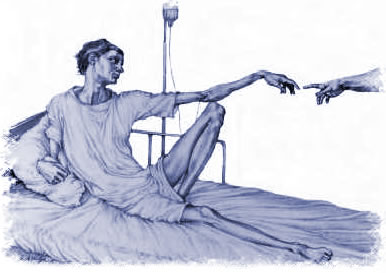
At GCSE, a Christian response to euthanasia would have included:
A summary of Biblical and church teaching can be found in the following excerpts from the GCSE Revision Guide
At A level, your answer may refer to the above, but you will probably structure your answer around the following ethical responses:
What the Bible says
We should not expect a straight-forward response to euthanasia from the Bible. When it was written, there may have been occasional examples of decisions people would have made about giving someone in pain an easy death, such as a soldier dying on a battlefield. However, the sorts of discussions people are having in the 21st century about whether to stop feeding someone, turn off life support, give a terminally ill patient a lethal dose of morphine etc. will not be directly covered by the Bible.
What you do have is general biblical responses, such as in Job 1:21 "God gives and God takes away". There are also countless passages on the sanctity of life, which argue that humans need to be treated in a very special way, and given the utmost respect, at all stages of life.
Looking at the Bible will not answer the most difficult question - are we giving someone the greatest dignity and respect by helping them to die peacefully, or by protecting their life until the moment of their death?
 What the churches say
What the churches say
The Roman Catholic Church is completely against euthanasia, seeing it in the same light as murder.
“Human life is sacred”. “Humanae Vitae”, 1968:
"2280: Everyone is responsible for his life before God who has given it to him. It is God who remains the sovereign Master of life. We are obliged to accept life gratefully and preserve it for His honour and the salvation of our souls. We are stewards, not owners, of the life God has entrusted to us. It is not ours to dispose of." Catechism
The Catholic Church supports starting a patient on a course of pain-killing drugs which may eventually lead to the patient's death (double effect). The intent has to be to reduce pain, however, and this only counts in cases where the risk of death is proportionate to the pain relief achieved.
The Catholic Church believes that ordinary treatments (such as feeding a patient) may not be discontinued, but extra-ordinary measures (like complicated operations) need not be undertaken to save the patient's life.
The Church of England disagrees with euthanasia. They echo the Roman Catholic Church in their belief in the sanctity of human life. However, they also teach that it is not always right to strive to keep a patient alive for as long as possible regardless of their quality of life.
God himself has given to humankind the gift of life. As such, it is to be revered and cherished. Those who become vulnerable through illness or disability deserve special care and protection. We do not accept that the right to personal autonomy requires any change in the law in order to allow euthanasia. Church of England 1999
In 2006, the church published its reasons for opposing the legalisation of assisted suicide. In summary, they were:
- sanctity of life
- common good
- autonomy
- proportionality
- preventing avoidable suffering
- respect for dignity
The Salvation Army says:
The Salvation Army believes that people do not have the right to death by their own decision...Only God is sovereign over life and death...the grace of God can sustain through any ordeal or adversity.
The Orthodox Church said, in 1996::
The Orthodox Church opposes murder, whether it be suicide, euthanasia or whatever, and regardless if it is cloaked in terms like 'death with dignity.' A person contemplating ending it all because of despondency instead should turn to God for strength and support. The Book of Job serves as a prime example of how someone overcomes extreme suffering by staying focused on God.
Christian theologians do not always agree with these principles, however. Hans Kung, a Catholic Priest, said:
...as a Christian and a theologian I am convinced that the all-merciful God, who has given men and women freedom and responsibility for their lives, has also left to dying people the responsibility for making a conscientious decision about the manner and time of their deaths.

